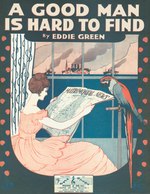 First edition cover | |
| Author | Flannery O'Connor |
|---|---|
| Language | English |
| Genre | Southern Gothic |
| Published | 1955 (Harcourt, Brace and Company) |
| Publication place | United States |
| Media type | Print (hardcover) |
| Pages | 256 pp |
| ISBN | 978-0156364652 |
A Good Man Is Hard to Find and Other Stories is a collection of short stories by American author Flannery O'Connor. The collection was first published in 1955. The subjects of the stories range from baptism ("The River") to serial killers ("A Good Man Is Hard to Find") to human greed and exploitation ("The Life You Save May Be Your Own"), although O'Connor described the ten-story collection as "nine stories about original sin, with my compliments". [1]
Contents
The majority of the stories include jarring violent scenes that make the characters undergo a spiritual change. Influenced by O'Connor's Catholicism, the stories frequently apply Catholic morals to life-or-death scenarios. For instance, in the story "A Good Man Is Hard To Find" the villain states, "She would have been a good woman if it had been somebody there to shoot her every minute of her life."
